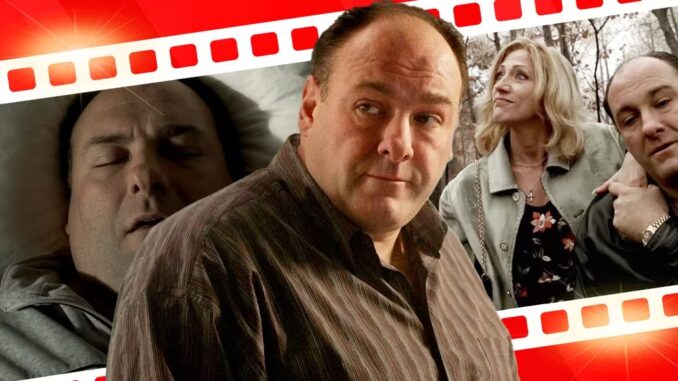
When you hear “The Sopranos” and “ending” in the same sentence, it’s likely that what you’re in for is some sort of discussion about the show’s ending as a whole. And that one is worth talking about, in due time, absolutely… but that one ending for the entire show shouldn’t completely overshadow all the other endings various episodes of the show had that were remarkably memorable, in one way or another.
In celebration of how well this darkly funny drama about mobsters, family, and therapy could conclude its various episodes, here’s a rundown of the very best episode endings the show ever had. Some of these are shocking, some are moving, and some are eerie, hinting at inevitable drama/conflict to come. Many are backed by memorable music, too, since The Sopranos was amazing at picking a fitting song to accompany the final scene and/or end-credit sequence for each episode.
“Pax Soprana” (1999)
Season 1, Episode 6

Even though the show arguably got better as it went along, The Sopranos established itself as a groundbreaking drama series pretty much right from season 1. The first season’s fifth episode, “College,” might well have been the show’s earliest masterful hour, but it was the season’s sixth episode, “Pax Soprana,” that contained debatably the first pitch-perfect final scene for an episode in the show’s run.
Jackie Aprile had died a couple of episodes earlier, setting in motion the conflict between Tony and Uncle Junior over who’d take over as boss of the DiMeo family. Junior’s made boss at the episode’s end, but something feels off, thanks to the music playing (an instrumental version of Xzibit’s “Paparazzi”), and the fact that the final scene also shows that the FBI have infiltrated the event where Junior’s being honored, and are catching onto the changing hierarchy.
“Proshai Livushka” (2001)
Season 3, Episode 2
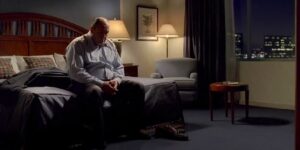
Though there is some catharsis in seeing a character like Livia Soprano exit the show, The Sopranos still manages to find some pathos in the death of a character who was unlovable. It’s a loss for the show brought about by the passing of Nancy Marchand between seasons 2 and 3, but Livia’s passing isn’t as sad for the characters, with moments of her wake in “Proshai Livushka” being played for laughs.
But it’s the ending that sneaks up on you and proves surprisingly poignant, with Tony watching The Public Enemy on TV and having parts of the film remind him of his complicated relationship with his mother, which makes him tear up. Beyond being unexpectedly moving, it’s also a neat way to pay homage to gangster cinema of old, with something like The Public Enemy paving the way for future gangster movies, which in turn paved the way for a show like The Sopranos to exist.
“Join the Club” (2006)
Season 6, Episode 2
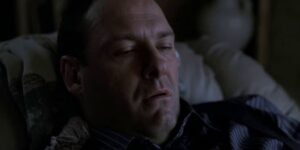
The final season of The Sopranos was split into two halves: season 6A, which aired in 2006, and season 6B, which aired in 2007. It was 21 episodes long in total, and probably had the highest concentration of hugely dramatic episodes (and striking episode endings), which feels fitting, given the season as a whole has to be climactic, and anything goes when it comes to shaking up the status quo.
“Members Only” ended with Tony getting shot by Uncle Junior, and he spends the next two episodes primarily in a coma dream, with him remaining in such an odd purgatory at the end of episode 2, “Join the Club.” Episode 3, “Mayham,” also ends in a memorable way, with Tony finally waking up, but there’s something uniquely haunting about the closing of “Join the Club,” with the use of Moby’s “When It’s Cold I’d Like to Die” contributing to this feeling, too.
“Employee of the Month” (2001)
Season 3, Episode 4
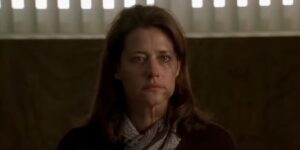
Few episodes of The Sopranos are as hard to talk about as “Employee of the Month,” which has a narrative that focuses on Tony’s therapist, Dr. Melfi. She’s sexually assaulted in a horrific sequence early on in the episode, and then is further distressed when, even after finding out the identity of her attacker, she learns that he’s to be let go, getting away with the crime he committed.
Melfi contemplates telling Tony about the situation at the episode’s end, breaking down while knowing that she could bring him to justice by informing Tony, who has the means to “disappear” such an individual. But she decides not to, and at that very moment, the episode ends. Melfi doesn’t get catharsis, and neither does the audience, which is brutal on multiple accounts… but it is powerful, and speaks volumes about Melfi’s sense of morality, however difficult it might be to uphold such values.
“Soprano Home Movies” (2007)
Season 6, Episode 13

Thanks to impeccable writing and acting, Tony Soprano managed to remain a compelling and complex character throughout the entirety of The Sopranos, never crossing over into entirely hateable territory despite doing many heinous things. What he does to Bobby in “Soprano Home Movies,” which kicks off season 6B, is absolutely one of the worst acts he commits in the entirety of the show’s run.
After a physical fight, Tony orders Bobby to carry out a murder, knowing full well that Bobby hasn’t before and that doing so will have an immense toll on him psychologically and emotionally. Bobby has to, because Tony’s the boss, and he’s clearly distraught by the episode’s end, with the final shot of him holding his kid while looking off into the distance being beautiful in a sad sort of way and, once more, haunting.
“Stage Five” (2007)
Season 6, Episode 14
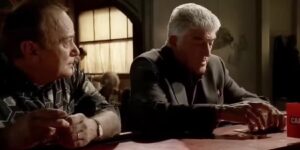
As mentioned before, season 6 of The Sopranos had drama and despair in spades, with “Stage Five” being another hugely impactful hour found in the show’s final batch of episodes. Much of the episode focuses on Johnny Sack dying in prison, which ensures that the conflict between the New Jersey and New York crews will only worsen, given Sack was only just managing to keep the peace between Tony and Phil.
Phil makes clear he no longer wants to tolerate any trouble from Tony and his crew, and will seek further retribution for his brother’s murder in the previous season. Speaking of Tony and his crew, there’s more tension than ever between him and Christopher, which is illustrated in a Godfather-esque final scene that takes place at a baptism… and that scene’s strung together with what Phil’s saying while the very unusual – and oddly chilling – song “Evidently Chickentown” by John Cooper Clarke plays. It certainly leaves an impression.
“The Blue Comet” (2007)
Season 6, Episode 20
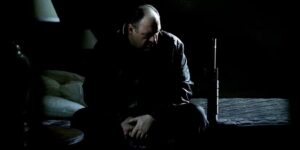
Speaking of the conflict between Tony and Phil, it explodes into outright gang warfare in the penultimate episode of The Sopranos, “The Blue Comet.” It’s an understandably bleak episode, since it sees the death of Bobby and also a shootout that puts Silvio into a coma… also, Christopher is already dead at this stage in the series, so Tony hardly has a main crew left by the episode’s end.
Appropriately, the final scene of “The Blue Comet” really drives home how alone Tony is, as he’s shrouded in darkness inside a safe house, looks exhausted, and is clutching a gun, seemingly knowing that he could be next, and that death could come at any moment. It well and truly sets the tone for the further darkness to come in the series finale.
“Long Term Parking” (2004)
Season 5, Episode 12

The most regrettably memorable scene in “Long Term Parking” is admittedly not the very last one. This episode is notoriously sad, and most well-remembered for, the fact that it features the death of Adriana. Her status as an informant for the FBI is learned by Christopher here, and once Tony finds out, her fate is sealed. She’s driven by Silvio into the woods, removed from the car, and shot just off-screen.
It’s absolutely brutal stuff for a character who deserved better, but then the final scene of “Long Term Parking” accentuates the sadness of the situation even more. Tony and Carmela are surveying some land Carmela wants to build a spec house on, and Tony is clearly lost in thought about what just happened to Adriana, and what such an event will mean going forward. There’s also the very bittersweet use of “Wrapped in My Memory” by Shawn Smith, which might sound overly sentimental on its own, but is oddly fitting – and more emotional – when heard in the context of this episode.
“Made in America” (2007)
Season 6, Episode 21

Love it or hate it or feel mixed on it, one thing’s for certain: you can’t talk about the endings of episodes of The Sopranos without mentioning the episode that concludes the series as a whole: “Made in America.” It’s a perfectly bleak and eerily understated hour, wrapping up the New York and New Jersey conflict rather suddenly, and in a manner which doesn’t really feel certain or comfortable.
Tony then spends much of the episode having conversations with the few characters still alive, and these scenes generally feel like bleak and unsentimental farewells (in a good way). And then the final scene, with “Don’t Stop Believin’” by Journey, the parallel parking, the onion rings, and the daring cut to black that still might well be the most defining moment in a show filled with iconic moments… yeah, that’s “Made in America” alright.
“Funhouse” (2000)
Season 2, Episode 13
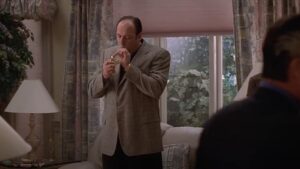
An all-time important episode of The Sopranos, “Funhouse” might well be the only episode that has an ending that could rival the one to “Made in America.” Sure, it’s not quite as surprising or likely to generate conversation/debate, but it wraps up an excellent season of television and ominously suggests nothing is going to be the same going forward, largely thanks to Big Pussy getting whacked for the same reason Adriana was whacked three seasons later.
“Thru and Thru” by The Rolling Stones is heard near the start of the episode, and it also accompanies the montage that wraps up the episode, with the visuals focusing on showing the aftermath of the various things Tony and his crew have done throughout the season, all the while they seem oblivious of the damage at a celebration for Meadow’s graduation. Then, Tony lights up a cigar, James Gandolfini successfully communicates multiple emotions at once, and there’s a fade to the shot of the ocean (Big Pussy’s final resting place), before a fade to black while the music swells and the end credits start. It’s honestly f**king perfect.